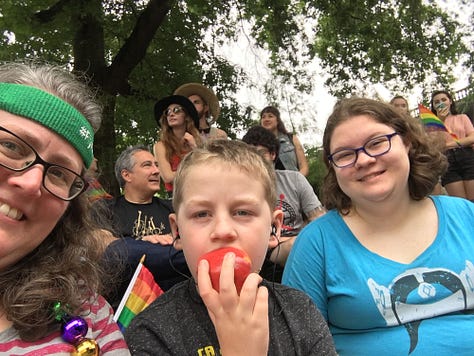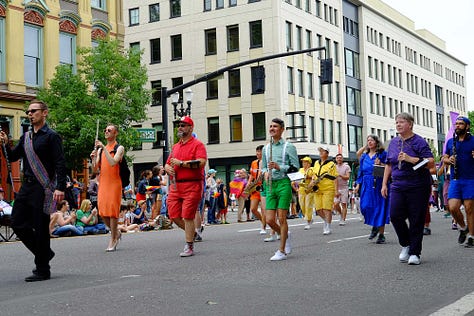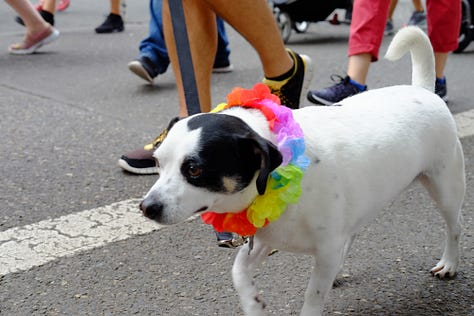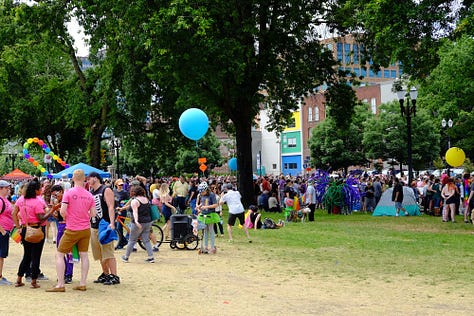On the day they turned 14, Aster came out to us.
There were some hints that year. The LGBTQ+ club. Crushes on girls. Being excited to see a cute girl with pink hair. Talks about supporting gay marriage.
Aster said they were a lesbian and identified as a female at that time. Josh and I responded by assuring them of our love and support and that their well-being was most important to us. We told Aster that we still hoped for the same things for them: good friends, dating, healthy relationships, safe sex, getting through heartbreak. We all agreed to keep an open communication as we learned about their needs and challenges as a gay person. We were the first people they told and they wanted to wait a while before telling other people, but I asked Aster’s permission to tell my sisters and close friends, who I leaned on for advice and strength.
We jumped right into support mode by going as a family to our first Pride parade, two days after Aster came out. The Portland Pride Parade and Festival downtown was crowded, fun and oh so colorful!
All kinds of people lined the streets, waving rainbow flags and cheering for each parade entry. Balloons and signs were everywhere:
Trans is beautiful.
Can’t even march straight.
If God hates gays then why are we all so damn cute?
Employees and supporters from a variety of organizations in the community marched by. Firefighters and police officers wore rainbow garlands. There were several bands and color guards. We saw Bridging Voices, the LGBTQ+ youth choir that Aster would eventually join. Queer people and straight allies walked hand in hand. Random people gave free hugs. And let’s not forget all the dogs wearing rainbow accessories.






It was amazing to witness not only the acceptance, but the celebration of LGBTQ+ people. Aster didn’t know many gay people yet, so it was exciting and reassuring for them to see this wonderful gathering.
But…I still had it in the back of my head that this was all wrong. Could something so authentic and beautiful and joyful be wrong in the eyes of God?
For several years prior, I had been part of the love the sinner, hate the sin crowd. You know, that person is wonderful even though they’re gay. Those poor people struggle with same-sex attraction. They have the right to marry who they choose. It’s not hurting anyone, but God condemns it. It says so in the Bible.
The church’s teachings about gay people were clear. Abominable sin. Impure and unnatural tendencies. Same-sex attraction could be overcome. Resist temptation. Don’t expect us to introduce you gay couples to our friends. There are no homosexual members of the church. The November policy. Prop 8. The Family Proclamation. Marriage is only between a man and a woman. Same-sex attraction is wrong, but as long as you don’t act on it, you’re okay. Being celibate for the rest of your life is better than having a gay relationship. Oh, but we just love the gays and they are welcome in our congregations.
Yes, the church’s position has changed over the years, perhaps they are more accepting now. But those years of homophobic teachings lingered in my head.
Was I supposed to love Aster but hate the sin? Was being gay really a sin? What did God want me to do? My child truly feels this is who they are. Am I just supposed to shun my child and tell them it’s all in their head? Tell them to change who they are? Do I dare think that my church leaders are wrong? I am supposed to trust and have faith in those men, who are prophets, seers and revelators. They tell me that my child’s sexual orientation is evil. Or could be overcome. The church leaders warned us not to support “worldly” views that did not uphold the plan of salvation as they taught it. I was terrified that if I showed too much support for the LGBTQ+ community that I would be called into the stake president’s office, like what happened with some members in the support group on Facebook. I feared that I would be questioned about supporting my gay child and if I truly sustained the church leaders.
I don’t know if I can accurately explain the anguish caused by this inner conflict. (In no way am I comparing my hurt to the years of homophobia, discrimination and violence that gay folks have been through. I’m expressing only my perspective as a cisgender, straight white mother.)
I felt like I had to choose between the church and my child.
I would have this conflict and fear for several years, and in some ways it’s still there. My loyalty to the church runs so deep that even when I felt peace about supporting Aster, I questioned my own feelings. I felt like I was losing my mind. I didn’t trust myself yet. I didn’t know how to think for myself without considering if the top 15 would approve, because it felt like they were the deciders of my salvation.
President Dallin H. Oaks said in the Fall 2018 General Conference:
But whatever the cause of conflict with those who do not understand or believe God’s plan, those who do understand are always commanded to choose the Lord’s way instead of the world’s way.
Those who do not believe in or aspire to exaltation and are most persuaded by the ways of the world consider this family proclamation as just a statement of policy that should be changed. In contrast, Latter-day Saints affirm that the family proclamation defines the kind of family relationships where the most important part of our eternal development can occur.
I felt like President Oaks was saying that if I didn’t automatically stand up and defend the Proclamation and stand against the gay lifestyle, that I was not a faithful Latter-Day Saint. Perhaps I was listening too much to the world’s way. If I was truly valiant, I wouldn’t have any conflict at all.
In September 2017, Aster started their freshman year at ACMA (Arts and Communications Magnet Academy), a charter school with a focus on the arts. When Aster came home from their first day of school, they said, “Mom! Mom! Everyone there is like me!” There were a lot of quirky, gay, neurodiverse kids at ACMA and it felt like home. Attending that school was a big blessing, because the church certainly did not feel like home for Aster.
In November, Aster told us that they did not want to go to church anymore.
I was afraid of that. When your child says they can’t handle being at church anymore, that is really hard to hear. The ward youth and leaders were all kind, friendly and accepting of Aster. They weren’t the problem. The issue was listening to lesson after lesson on the family proclamation. Talking about gender roles. The slight homophobic comments. Feeling that being gay was bad. You can’t make it to heaven if you act on being gay. Aster also didn’t really believe in the gospel or have a strong desire to be there.
We responded with love and understanding. Their emotional and mental health was most important to us, and if being at church was not emotionally healthy, then we supported them not going. I remember telling Aster that even if they didn’t care for our religion, to not give up on spirituality altogether. They would need to seek for and nurture their own spirituality, whether that be with Jesus, Buddha or the cosmos. Mom and Dad wouldn’t always be by their side and a connection with the divine would be vital in helping them get through the challenges of life.
Inside, I was crushed. Crushed that an environment and organization that had been so positively impactful in my youth was not the same for my child. I had wanted so badly for Aster to have many of the same fun experiences and testimony-building moments I had as a teenager. It crossed my mind for about one second that we could make some kind of bribe for attending church, but that didn’t stay with me for long. That would’ve broken Aster and our relationship and any positive connection with the church.
Shortly after that talk, Josh helped Aster write an email to the Young Women leadership and the bishop explaining that they wouldn’t be attending church anymore. Aster hadn’t come out to people at church yet, so they stated that they were working through some personal issues that made them uncomfortable with attending church. They also wrote that none of those issues had anything to do with anyone personally in the ward. Everyone there had been wonderful, accepting and friendly. The Young Women leaders and the bishop responded with kindness and respect, and reminded Aster that they are always welcome at church anytime.
I was grateful for the bishop’s support, but I didn’t know anyone in my local wards that had a gay child. I felt alone. Soon I started searching for support in the community. My internet search took me first to the Family Acceptance Project, The Trevor Project, PFLAG, the Q-Center and Affirmation. Next, I found the Mama Dragons. Thank heaven for the Mama Dragons. They are an organization that “supports, educates and empowers mothers of LGBTQ+ children.” I read post after post on their Facebook page from moms just like me. Mamas who wanted to celebrate their unique gay kids, who didn’t know all the different terms, were overwhelmed and some who felt a real conflict with their church’s doctrines about homosexuality. Some of the mamas were Mormons, some were of different faiths. I am so grateful for the Mama Dragons, who gave me hope that I could be the mother that Aster needed.
I wasn’t completely sure about what to do with my inner conflict, but I knew I needed to support Aster. This meant not only acknowledging them as gay, but celebrating their beautiful sexuality and identity. I became a Mama Dragon.




